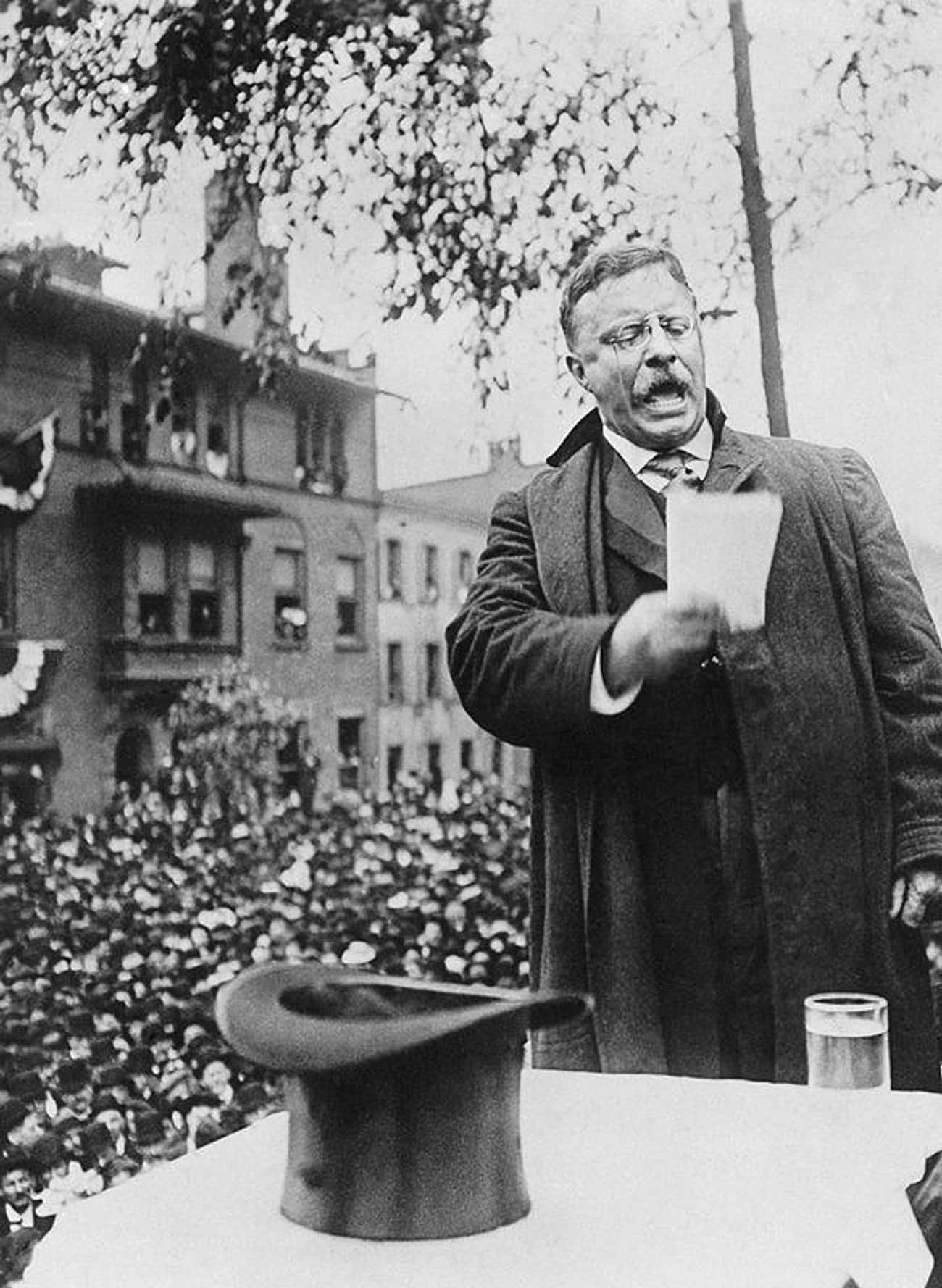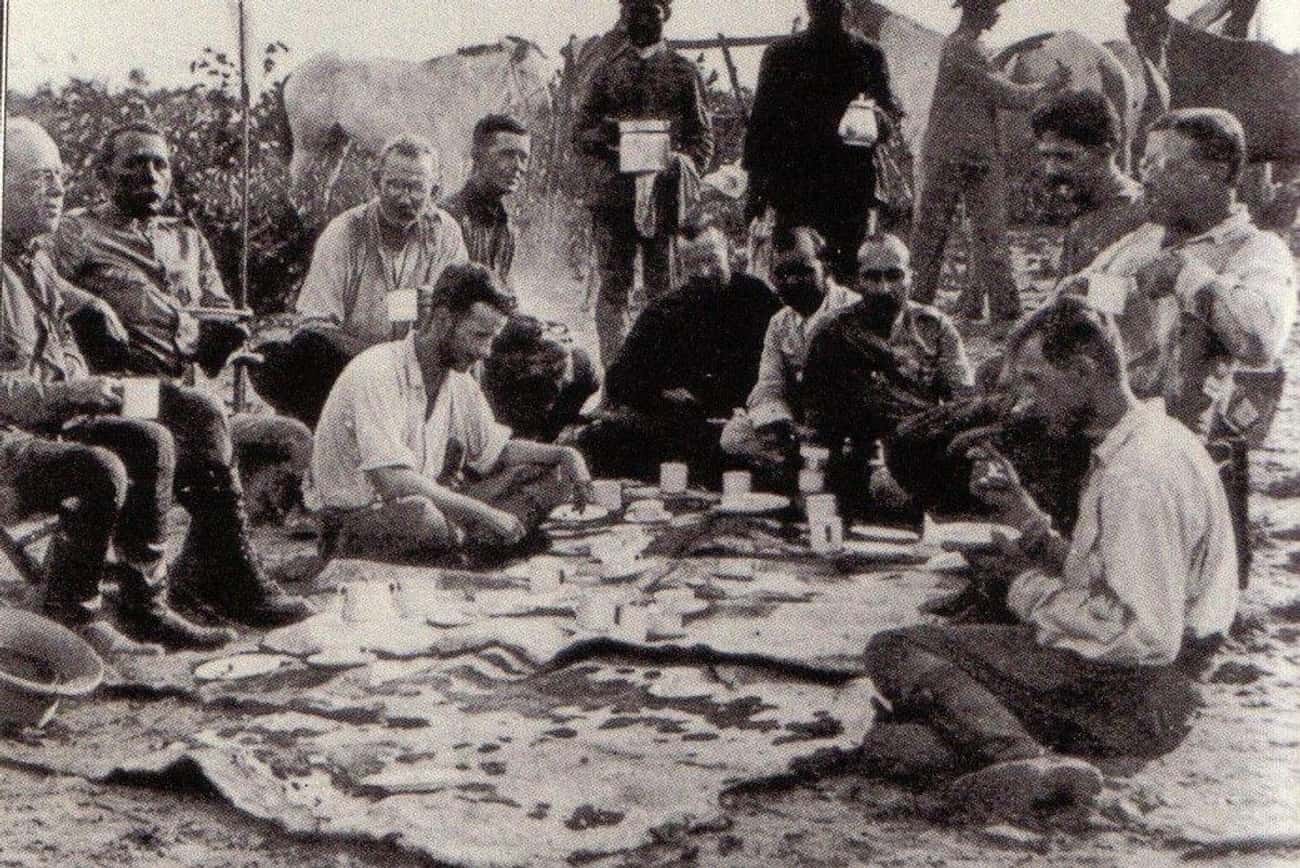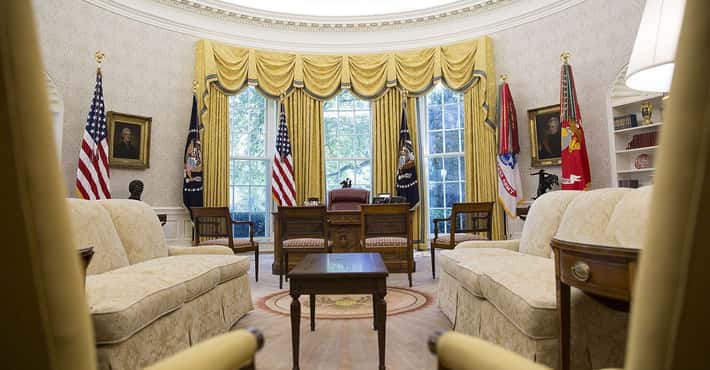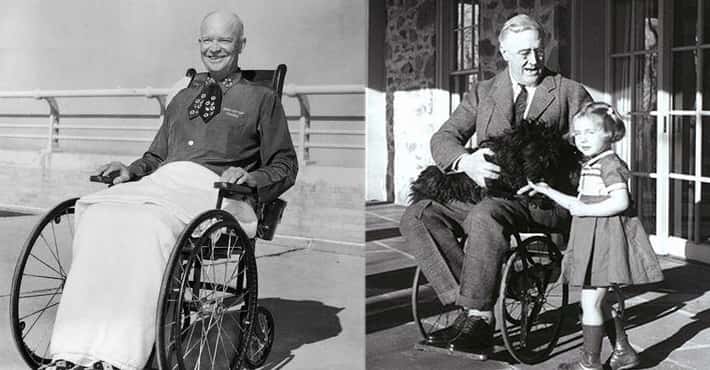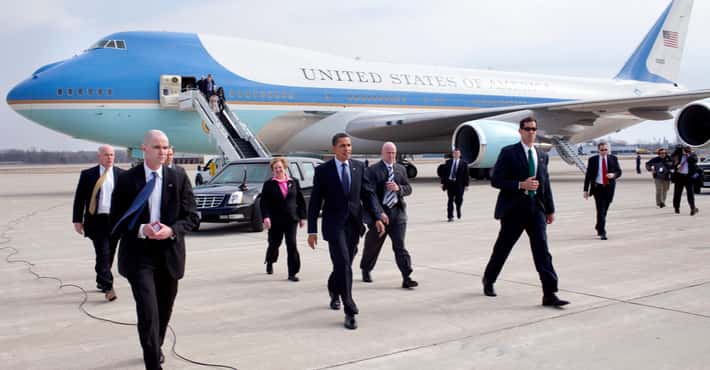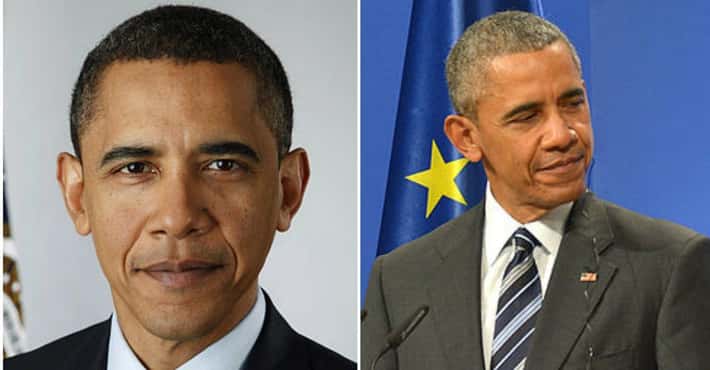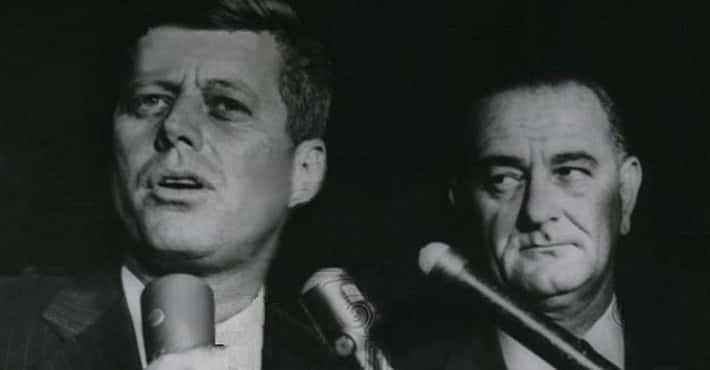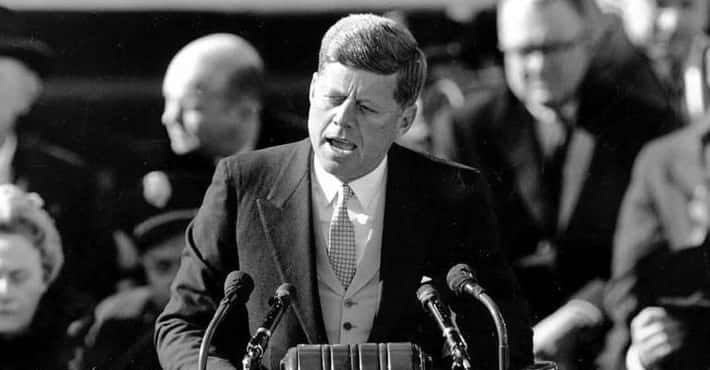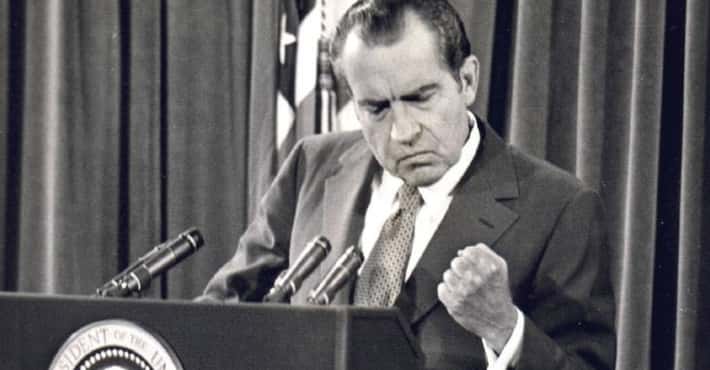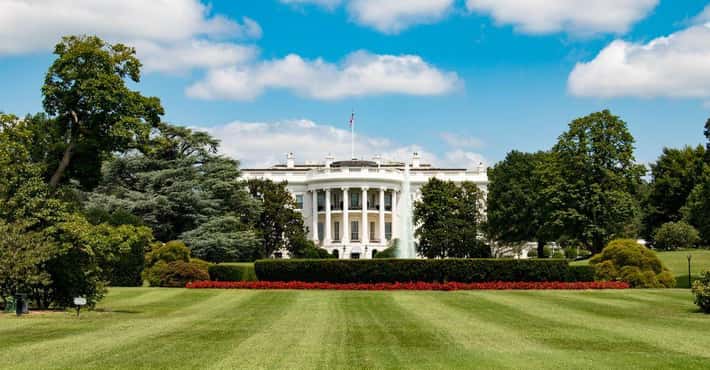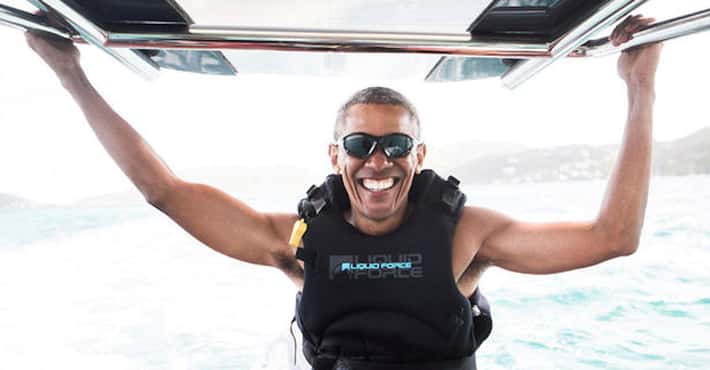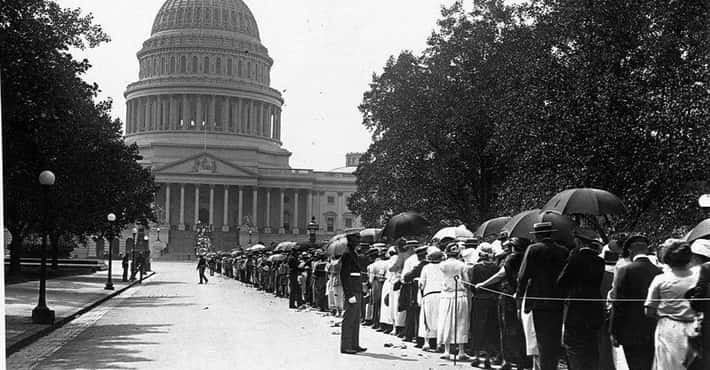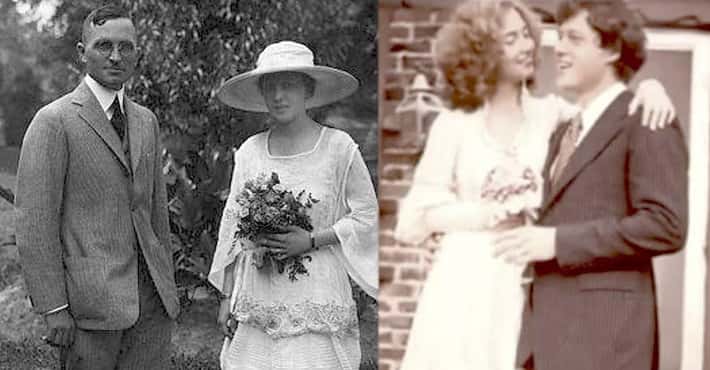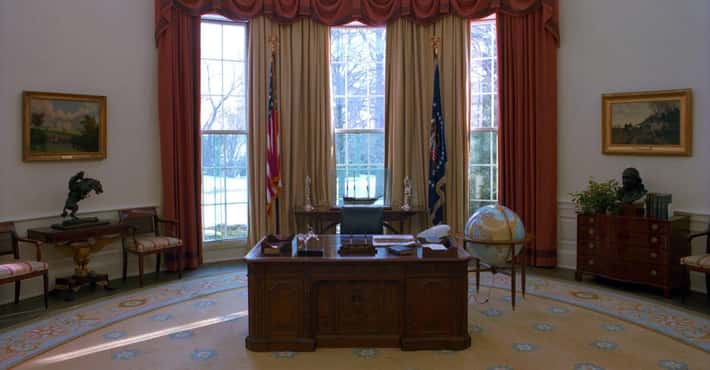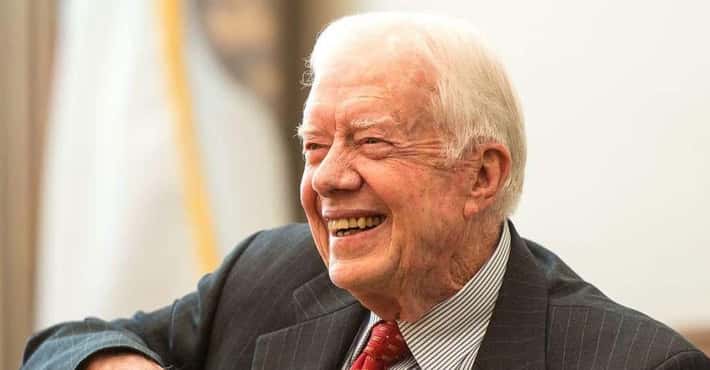11 Dramatic Stories About US Presidents That Changed The Way We See Them
Most of us are familiar with huge, headline-making presidential stories, from the fabled cherry tree to Watergate to the Clinton-Lewinsky affair. But in the White House and outside of it, these lesser-known stories about US presidents could each warrant their own movie. From multiple mistresses (looking at you, Warren G. Harding) to heroic acts of bravery, these captivating tales made us see these prior POTUSes in a whole different light.
You may think modern-day politics is as strange as it gets, but history proves that since the country's beginnings, the West Wing has seen plenty of drama. Buckle up, because you're in for a wild ride.
In the election of 1912, former president Teddy Roosevelt disliked Republican party candidate William Howard Taft so much that he decided to invent a new party - affectionately called the "Bull Moose Party" - and run for a third term. While heading out of his hotel to give a campaign speech in Milwaukee, WI, Roosevelt was shot in the chest while in an open-air car.
Luckily, the assassination attempt was thwarted by a makeshift bulletproof vest of sorts. Roosevelt's 50-page speech and spectacles case tucked in his jacket managed to slow the bullet as it entered his chest. Still, Roosevelt's staff planned to reroute to the hospital - as people tend to do when someone is bleeding profusely. Instead, Roosevelt insisted on going to the auditorium and delivering his 1-and-a-half-hour long speech, showing off his bullet-ridden stack of papers to the audience and famously declaring, "It takes more than that to kill a bull moose."
Roosevelt didn't win the election, but he did receive the highest number of votes of any independent candidate in history and cemented his status as a real-life legend.
- 2194 VOTES
Warren G. Harding Had A Secret Love Child Shortly Before His Presidency
Long before the scandalous affairs of John Edwards or Bill Clinton, there was Warren G. Harding, another politician who didn't let a little thing like marriage get in the way of having multiple affairs. One of his mistresses, Nan Britton, was 31 years younger than Harding, and said the two began their relationship in 1917.
The affair continued for 6-and-a-half years, and in 1919, Britton gave birth to a child, Elizabeth Ann, whom she said was conceived in Harding's Senate office. Harding became president in 1921; Britton said the trysts continued in the White House in "a small closet in the anteroom." The president didn't meet his daughter, but provided financial support - at least while he was still alive. When he passed in 1923, Britton discovered he'd left nothing for her or her daughter, and wrote a tell-all book, The President's Daughter, to make ends meet.
Britton received heavy backlash, and many accused her of lying and defaming the late president's legacy, calling her a "pervert" and "degenerate." A feud continued between Harding's two lines of descendants. Nearly a century later, in 2015, genetic testing confirmed that Elizabeth Ann was indeed Harding's biological daughter.
- Photo:
3140 VOTESTheodore Roosevelt Nearly Died Charting An Amazon River Tributary
A lifelong conservationist and adventurer, Teddy Roosevelt set off on a trip that nearly killed him in 1913. The 55-year-old former president had recently lost the 1912 election, where he'd been running for a third time. When he was invited by Argentina to do a lecture series in South America, Roosevelt decided to take things a step further.
He decided to team up with Brazilian explorer Colonel Candido Rondon to chart a tributary of the Amazon known as the "River of Doubt," which had never been charted by Europeans. When warned of the dangers, he responded, "If it is necessary for me to leave my bones in South America, I am quite ready to do so."
In late 1913, Roosevelt set out with a team including his son Kermit. The first portion of the expedition involved a two-month trek on land to get to their starting point on the river. Half the pack animals perished and several men fell ill of tropical diseases. By the time they reached the river, the dwindling supplies only allowed 22 men to proceed on the expedition.
On the river, the group faced the hostilities of nature: stinging flies, mosquitoes, and piranhas. At one point, Roosevelt was bitten by a snake, but its fangs only broke into his leather boot, rather than his skin. The rapidly moving water also caused trouble. Kermit's canoe was sucked into a whirlpool and fell down a waterfall. While he and another man managed to swim to shore, a third man drowned.
The human element of the trip proved dangerous as well. A group of natives stalked the group, and although they didn't harm them, they shot Rondon's dog with arrows. Then, a porter on the expedition team murdered another in the group after he was caught stealing food; the men abandoned the murderer in the jungle. Meanwhile, Roosevelt began to experience alarmingly high fevers after slicing his leg open on a rock. He repeatedly told the group to leave him behind to perish, but his son refused.
Roosevelt barely survived, and finished the expedition having lost a quarter of his body weight. The trip left him in poor health until his passing at age 60.
Several US presidents have been assassinated, and several others have survived attempts, but none with more flair than seventh president Andrew Jackson, better known as “Old Hickory” - and for good reason, as one would-be assassin found out.
On January 30, 1835, Richard Lawrence came up to the 67-year-old Jackson as he left a congressional funeral and pulled a pistol on him, only to have the gun misfire. Jackson began beating the man viciously with his cane in retaliation, but Lawrence was able to pull a second gun from his jacket during the melee - which also jammed. By this point, aides were able to wrestle Lawrence away and into custody.
Jackson became convinced the attempt was made at the behest of his political enemies, even though all evidence pointed to Lawrence being a mentally unstable lone wolf. Still, Jackson spent the rest of his presidency paranoid of another attack - and his vice president, Martin Van Buren, started carrying two loaded pistols with him into the Senate.
- 5127 VOTES
During World War II, US Navy Lieutenant John F. Kennedy held his post on a patrol torpedo boat near the Solomon Islands. When a Japanese destroyer rammed the boat, he and many of his men were tossed into the water. The survivors swam to the nearest island along with JFK, who tugged one of his injured crewmates along by keeping the man's life vest strings in his mouth as he swam.
Days later, JFK directed his men through another swim in hopes of finding fresh water and food. While on this island, he and a companion set out swimming again to find some hope for survival, and encountered two men canoeing. The canoers transported a message that Kennedy carved into a coconut, a message that ultimately saved the stranded crew.
The coconut was preserved, and JFK even used it as a paperweight when he served as president.
George H.W. Bush’s pre-presidential career is well-known, but people often pay more attention to his role as CIA director than his time with the US Navy - even though the latter is likely far more exciting. Not only did Bush make a personal choice to enlist after the events of Pearl Harbor; he also went on to serve his country with distinction and, in one incident, a serious amount of bravery.
On September 2, 1944, Bush was piloting one of four bombers sent to attack the Japanese base on Chichi Jima. Right as the engagement began, his plane was hit by enemy fire, one of his crew members was killed, and his engine burst into flames. However, Bush saw the mission through and dropped his entire payload, scoring several direct hits. He then flew several miles before he and the remaining crewmate bailed out into the ocean. The other man’s parachute failed to open and he fell to his demise, leaving Bush as the only survivor.
- Photo:
- Harris & Ewing
- Wikimedia Commons
- No known copyright restrictions
In August 1905, future US president Warren G. Harding began an affair with Carrie Fulton Phillips, the wife of dry-goods store operator James Phillips - despite the fact that James was one of his best friends. The relationship started while Harding was the lieutenant governor of Ohio and lasted 15 years (including Harding's six years as a senator), ending before he entered the White House.
Of course, Harding was also married the whole time. His wife, Florence, had ongoing kidney issues, and according to her husband's love letters, "There isn’t one iota of affection in my home relationship... It is merely existence, necessary for appearance’s sake."
While he may not have held any burning passion for his wife, Harding's love letters show that he didn't shy away from getting intimate with his mistress. He referred to his member as "Jerry," and expressed a desire to take Carrie on a trip to "Mount Jerry." As he wrote in these stanzas in 1912:
I love to suck
Your breath away
I love to cling -
There long to stay...I love you garb’d
But naked more
Love your beauty
To thus adore...The relationship became strained, however, as the US entered World War I. Carrie, who'd spent time in Berlin, had a firmly pro-German stance, which she and Harding often argued about in their correspondence. Some even speculate that Carrie, who ended up under federal surveillance, was a German spy.
From their letters, it seems she may have even threatened to out their relationship, right around the time Harding was angling for the 1920 Republican presidential nomination. As the former president writes, "Your proposal to destroy me, and yourself in doing so, will only add to the ill we have already done." The lengthy affair ended around this time, though some think Carrie received some hush money.
Despite Harding's suggestion that his mistress burn his letters ("They are too flammable to keep"), she didn't. Fearing that the torrid notes would further decrease Harding's already low popularity, his family urged a judge to seal them for 50 years. It was only in 2014 that the world got to see Harding's softer side:
Honestly, I hurt with the insatiate longing, until I feel that there will never be any relief until I take a long, deep, wild draught on your lips and then bury my face on your pillowing breasts...
Wouldn’t you like to get sopping wet out on Superior - not the lake - for the joy of fevered fondling and melting kisses? Wouldn’t you like to make the suspected occupant of the next room jealous of the joys he could not know, as we did in morning communion at Richmond?
- Photo:
- Photo:
- US National Archives and Records Administration
- Wikimedia Commons
- Public domain
Few past occupations look more foreboding on a resume than “hangman,” but that’s one of the jobs Grover Cleveland did before becoming President of the United States. He served as the sheriff of Erie County, NY, from 1871 to 1874, and one of his duties was executing those assigned the death penalty.
Cleveland could have delegated that particular duty, but instead he insisted on doing it himself, first hanging a young man convicted of matricide. Cleveland executed one other man during his tenure as sheriff. Some praised him for his honor, saying that he did the job so no one else had to, while later political opponents tried to use the executions to label him as bloodthirsty. Cleveland was thereafter known as the "Hangman of Buffalo."
- Photo:
- Photo:
- US Junior Chamber of Commerce PD-PRE1978
- Wikimedia Commons
- Public domain
960 VOTESThe FBI Investigated JFK For Having An Affair With An Alleged Nazi Spy
One of young John F. Kenney's notable lovers was Inga Arvad, a suspected spy for Germany in World War II. Arvad was a guest of Adolf Hitler at the 1936 Summer Olympics. As a journalist, she interviewed the Führer on multiple occasions, who described her as the "perfect Nordic beauty." Because of this, and her relationship with JFK while he worked at the Office of Naval Intelligence, both the Kennedy family and the government feared Arvad was a "honey trap" spy.
J. Edgar Hoover led an extensive investigation into the matter, which didn't reveal any solid evidence. Kennedy was eventually transferred to South Carolina in an attempt to end the relationship. However, Arvad visited him several times, meeting him in hotel rooms that the FBI had bugged, allowing them to hear much more than they'd bargained for.
Eventually, outside pressure ended the relationship. Arvad continued to be plagued by suspicion over her possible Nazi ties. Luckily for JFK, their relationship didn’t negatively affect his political career.
In a letter to the future president, Arvad wrote:
Remember to save this letter for defense against Inga-Binga in the Supreme Court of the US. I will be seeing you - here or there or somewhere in the world, and it will be the best, or rather second best moment in a lifetime. The best was when I met you.
- Photo:
- Photo:
- Library of Congress
- Wikimedia Commons
- Public domain
Abigail Adams's admonition to her husband John that he "remember the ladies" was apparently ignored by her son, John Quincy Adams. When the younger Adams was president, Anne Newport Royall was a relatively poor widow and writer, trying her hand at a journalism career. When she arrived in Washington, DC, she politely asked the president's office for an interview, which was firmly refused. It was clear that a woman was not going to get an interview with Adams the traditional way.
Asking around town, Royall learned that Adams liked to swim in the nude in the Potomac River. So, one day she found his clothes on the shore and sat on them, refusing to let the man clothe himself until he agreed to an interview. The sixth President of the United States was impressed with Royall and not only gave her the interview, but also advocated for her to receive her late husband's pension by writing a letter to Congress.
- Photo:
- Photo:
- B.L. Rider
- Wikimedia Commons
- Public domain
Before he became a national hero, Abraham Lincoln was something of a local legend. Prior to his legal and political career, he worked at a general store in New Salem, IL, and had an impressive wrestling record: of 300 matches, he only had one documented defeat. During one particularly heated match he reportedly shouted, "I’m the big buck of this lick. If any of you want to try it, come on and whet your horns!"
The story goes that while Lincoln generally preferred reading, the general store owner, Denton Offutt, would brag about his tall and lanky employee and his grappling skills. This led to a challenge from the town bully, Jack Armstrong, leader of the Clary’s Grove Boys. This group of ruffians would allegedly haze town newbies by shoving them into barrels, nailing them shut, and rolling them down hills.
The Armstrong-Lincoln match was supposedly quite the spectacle, with the townspeople gathering and placing bets. In the tense grapple, Armstrong reportedly tried to trip Lincoln, and Lincoln in return "shook him like a rag." By some accounts, when Armstrong's defeat was clear, other members of the Clary's Grove Boys tried to gang up on Lincoln, who agreed to take them one by one. But at this point, Armstrong admitted defeat.
While much of Lincoln's wrestling career has taken on a legendary quality, he was inducted into the National Wrestling Hall of Fame. During his political career, opponent Stephen Douglas brought up Lincoln's grappling days as a mocking point in the Senate race. While Lincoln lost, he later faced Douglas in the presidential election two years later, where his wrestling past was a point of pride and worked to his advantage.
- Photo:


